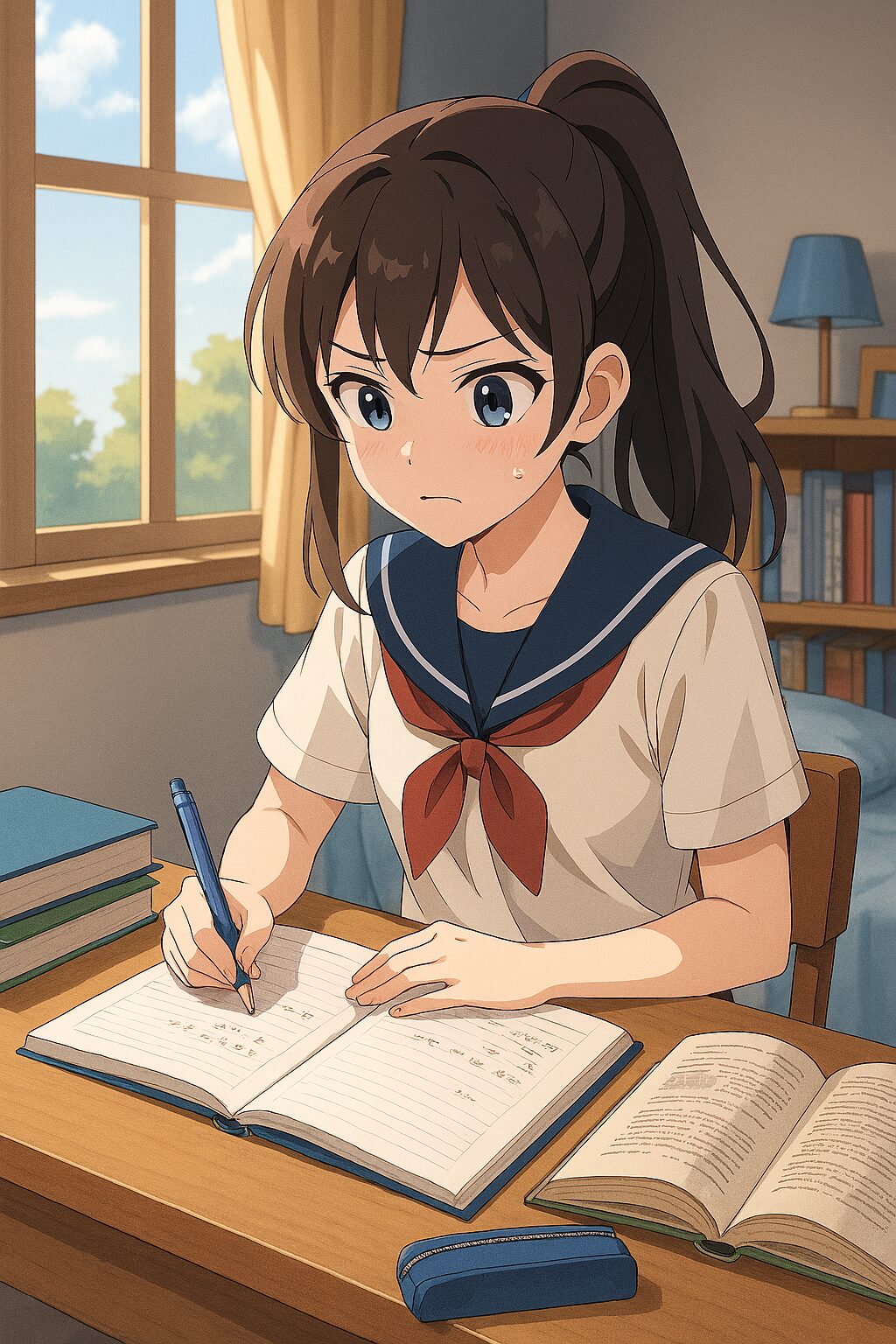- Introduction: Why is August 31 “Homework Day” in Japan?
- Summer Vacation and Homework Culture in Japan
- How Does It Differ from Other Countries?
- 🎓 Three Ways to Reflect on Homework Day — Education, Memory, and the Future
- Conclusion: Homework as a Gift, Not Just a Task
- Related Links & Resources
- はじめに:なぜ8月31日が「宿題の日」なのか?
- 日本の夏休みと宿題文化
- 海外との比較:宿題の意味は違う?
- 🎓「宿題の日」に考えたい3つの視点──教育、記憶、そして未来
- おわりに:宿題は“義務”ではなく“贈り物”かもしれない
- 関連リンク・参考資料
Introduction: Why is August 31 “Homework Day” in Japan?
In Japan, elementary and junior high schools typically have a summer break lasting around 40 days, from late July to the end of August. The final day of this break, August 31, is famously known as the day students rush to finish their homework.
“Homework Day” was proposed by educational support organizations to encourage reflection on the privilege of having access to education. It’s not just about deadlines — it’s a day to reconsider the meaning of learning itself.
Summer Vacation and Homework Culture in Japan
🌞 Structure of Summer Homework
Unlike in many Western countries where summer is a time for exploration and relaxation, Japanese students are assigned a variety of homework tasks. These typically include:
- Math and kanji practice drills
- Book reports
- Independent research projects
- Daily journals or illustrated diaries
- Crafts and artwork
These assignments aim to maintain academic skills while fostering planning, creativity, and observation.
🎐 Cultural Significance of Homework
In Japan, values like “effort is a virtue” and “perseverance builds strength” are deeply rooted. Homework reflects these ideals. Book reports and research projects help students develop critical thinking and self-expression.
Tasks like illustrated diaries and seasonal crafts also connect students to nature and traditional seasonal awareness, which are central to Japanese culture.
How Does It Differ from Other Countries?
In the U.S. and Europe, summer is often seen as a time for family trips, camps, and personal growth. Homework is minimal or nonexistent.
In contrast, Japanese students associate summer vacation with structured assignments. This reflects not only differences in educational systems but also societal values around discipline and responsibility.
Reference: Ministry of Education, Culture, Sports, Science and Technology (Japan)
🎓 Three Ways to Reflect on Homework Day — Education, Memory, and the Future
1. A Day to Appreciate Education
Japan’s public education system ensures equal access to learning. But globally, many children still lack this opportunity. Homework Day invites us to reflect on the privilege of being able to learn.
Reference: UNICEF Education Programs
2. A Day to Revisit Personal Memories
Homework evokes a range of emotions — stress, pride, regret, accomplishment. Whether it’s a summer diary, a bug collection, or a heartfelt book report, these tasks are records of personal growth.
3. A Day to Rethink the Future of Learning
With the rise of AI and digital tools, homework is evolving. Online platforms, inquiry-based learning, and project-based assignments are becoming more common.
Homework Day is a chance to consider what learning should look like in the future — not just in Japan, but globally.
Conclusion: Homework as a Gift, Not Just a Task
As children, we may have dreaded homework. But looking back, it was a time to develop our thoughts and face ourselves.
On August 31, Homework Day, let’s take a moment to reflect on what learning truly means — and how it shapes who we are.
Related Links & Resources
📚8月31日は「宿題の日」──日本の夏休みと“学び”の意味を考える日
はじめに:なぜ8月31日が「宿題の日」なのか?
日本の小中学校では、夏休みが7月下旬から8月末まで約40日間あります。そして、その最終日である8月31日は、全国の子どもたちが「宿題のラストスパート」に追われる日として知られています。
この日を「宿題の日」として記念日に制定したのは、教育支援団体などが「学べる環境のありがたさを再認識する日」として提唱したことがきっかけです。SNSでも「#宿題終わらない」「#自由研究まだ」などの投稿が増えるこの日は、単なる“締め切り”ではなく、教育の意味を見つめ直す日として注目されています。
日本の夏休みと宿題文化
🌞 夏休みの構造
日本の夏休みは、欧米のように「自由な探究の時間」というよりも、「学校から課された課題をこなす期間」としての側面が強くあります。代表的な宿題には以下のようなものがあります:
- 計算ドリルや漢字練習帳
- 読書感想文
- 自由研究
- 絵日記
- 工作・図画
これらは、学力の維持だけでなく、計画性・創造性・観察力などを育む目的もあります。
🎐 宿題と日本文化の関係
日本では「努力は美徳」「継続は力なり」という価値観が根強く、宿題もその延長線上にあります。特に「読書感想文」や「自由研究」は、自分の考えを言語化する力や探究心を養う重要な機会とされています。
また、絵日記や工作などの課題は、季節感や自然とのふれあいを重視する日本文化とも深く結びついています。
海外との比較:宿題の意味は違う?
アメリカやヨーロッパでは、夏休みは「家族との時間」「旅行」「キャンプ」など、体験重視の過ごし方が主流です。宿題はほとんど出されないか、出されても最低限。
一方、日本では「夏休み=宿題のある休み」という認識が一般的。これは教育制度の違いだけでなく、社会全体の価値観にも関係しています。
参考:文部科学省の公式サイト
🎓「宿題の日」に考えたい3つの視点──教育、記憶、そして未来
1. 教育のありがたさを再認識する日
日本では、義務教育が整備され、誰もが平等に学ぶ機会を得られます。しかし世界には、教育を受けることが困難な地域も多く存在します。「宿題の日」は、そうした現実に目を向け、学べることのありがたさを再認識する日でもあります。
参考:ユニセフの教育支援ページ
2. 記憶と感情をたどる日
「宿題」という言葉には、誰もが一度は経験した焦り・達成感・後悔・誇りといった感情が詰まっています。絵日記に描いた夏の空、自由研究で調べた昆虫、読書感想文に書いた心の動き──それらはすべて、自分自身と向き合った記録です。
3. 未来の学びを考える日
AIやデジタル技術が進化する現代において、「宿題」の形も変わりつつあります。オンライン教材、探究型学習、プロジェクトベースの課題など、学びはより柔軟で創造的になっています。
「宿題の日」は、未来の教育のあり方を考えるきっかけにもなります。
おわりに:宿題は“義務”ではなく“贈り物”かもしれない
子どもの頃は「面倒だな」と思っていた宿題。でも、大人になって振り返ると、それは自分の考えを育てる時間であり、自分自身と向き合う機会だったのかもしれません。
8月31日、「宿題の日」。この日をきっかけに、学びの意味をもう一度見つめ直してみませんか?



コメント